News
Israel strikes heart of Beirut, killing at least six
Published
4 months agoon
By
Ekwutos Blog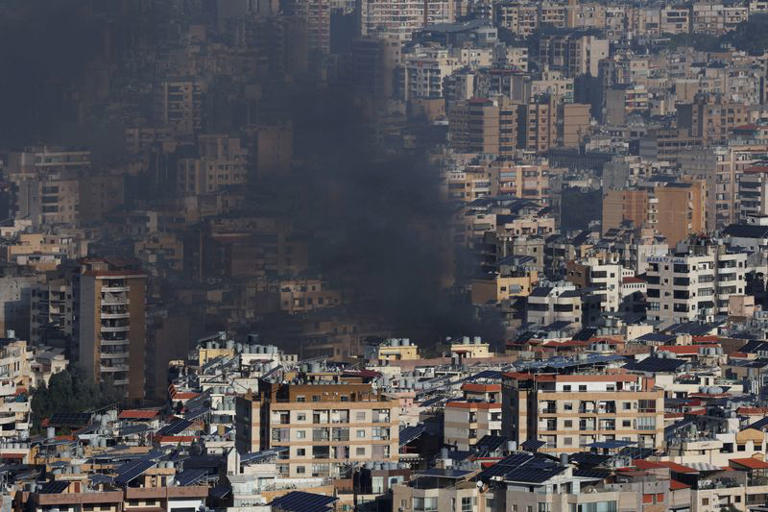
By Timour Azhari and Ari Rabinovitch
BEIRUT/JERUSALEM (Reuters) -Israel bombed Beirut early on Thursday, killing at least six people, after its forces suffered their deadliest day on the Lebanese front in a year of clashes with Iran-backed Hezbollah.
Israel said it had conducted a precise air strike on the Lebanese capital. Reuters witnesses reported hearing a massive blast, and a security source said it targeted a building in the district of Bachoura near parliament, the closest an Israeli strike has come to the central downtown district of Beirut.
At least six people were killed and seven wounded, Lebanese health officials said. A photo circulating on Lebanese WhatsApp groups, which Reuters could not immediately verify, showed a heavily damaged building with its first floor on fire.
“Another sleepless night in Beirut. Counting the blasts shaking the city. No warning sirens. Not knowing what’s next. Only that uncertainty lies ahead. Anxiety and fear are omnipresent,” U.N. special coordinator in Lebanon, Jeanine Hennis-Plasschaert, said on X on Thursday.Three missiles also hit the southern suburb of Dahiyeh, where Hezbollah leader Hassan Nasrallah was killed last week, and loud blasts were heard, Lebanese security officials said.
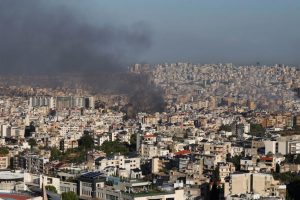
Smoke rises after a strike amid ongoing hostilities between Hezbollah and Israeli forces, in Beirut’s southern suburbs and its surroundings, as seen from Hadath, Lebanon October 3, 2024. REUTERS/Mohamed Azakir
© Thomson Reuters
The elimination of Nasrallah dealt a major blow to the movement and removed Iran’s most powerful proxy in the Middle East.
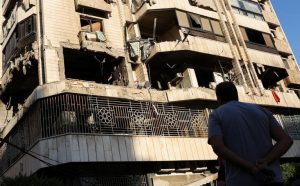
A man looks at a damaged building at the site of an Israeli strike on central Beirut’s Bachoura neighbourhood, amid ongoing hostilities between Hezbollah and Israeli forces, in Beirut, Lebanon October 3, 2024. REUTERS/Emilie Madi
© Thomson Reuters
Hezbollah and Iran’s other regional allies, Yemen’s Houthis and armed groups in Iraq, have launched attacks in the region in support of Hamas in its war with Israel in Gaza.
The Houthis, who have been carrying out attacks in shipping lanes in and around the Red Sea that have disrupted international trade, said on Thursday they attacked Israel’s commercial capital Tel Aviv with drones.
“The operation achieved its goals successfully by the arrival of the drones without being detected or shot down by the enemy,” the group’s military spokesperson Yahya Saree said.
Israel said it intercepted a suspicious aerial target in the area of central Israel early on Thursday.
The Israel Defense Forces (IDF) urged residents of Lebanese villages who have evacuated their homes not to return until further notice. “IDF raids are continuing,” spokesperson Avichay Adraee said on X on Thursday.
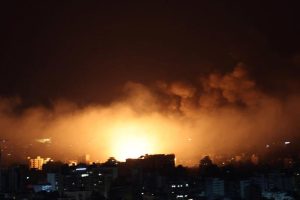
Fire and smoke rise over Beirut’s southern suburbs after a strike, amid ongoing hostilities between Hezbollah and Israeli forces, as seen from Sin El Fil, Lebanon, October 3, 2024. REUTERS/Amr Abdallah Dalsh © Thomson Reuters
A day after Iran fired more than 180 missiles into Israel, Israel said on Wednesday eight soldiers were killed in ground combat in south Lebanon as its forces thrust into its northern neighbour.
‘IRAN’S AXIS OF EVIL’
The Israeli military said regular infantry and armoured units joined ground operations in Lebanon on Wednesday as Iran’s missile attack and Israel’s promise of retaliation fanned concern of a wider conflict in the oil-producing Middle East.
Hezbollah said its fighters engaged Israeli forces inside Lebanon. The movement reported ground clashes for the first time since Israeli forces pushed over the border on Monday. Hezbollah said it had destroyed three Israeli Merkava tanks with rockets near the border town of Maroun El Ras.
Israeli Prime Minister Benjamin Netanyahu, in a condolence video, said: “We are at the height of a difficult war against Iran’s Axis of Evil, which wants to destroy us.
“This will not happen because we will stand together and with God’s help, we will win together.”
Iran said on Wednesday its missile volley – its biggest ever assault on Israel – was over, barring further provocation, but Israel and the United States promised to hit back hard.
However, U.S. President Joe Biden said he would not support any Israeli strike on Iran’s nuclear sites in response to its ballistic missile attack and urged Israel to act “proportionally” against its regional arch-foe.
Biden joined a call with other leaders of the Group of Seven major powers to coordinate a response, including new sanctions against Tehran, the White House said.
G7 leaders voiced “strong concern” over the Middle East crisis but said a diplomatic solution was still viable and a region-wide conflict was in no one’s interest, a statement said.
China urged the United Nations Security Council to take “urgent actions” to de-escalate the situation in the Middle East.
Western nations have drafted contingency plans to evacuate citizens from Lebanon after Tuesday’s dramatic escalation, but none have launched a large-scale military evacuation yet, though some are chartering aircraft as Beirut airport stays open.
1.2 MILLION LEBANESE DISPLACED
Israel’s addition of infantry and armoured troops from the 36th Division, including the Golani Brigade, the 188th Armoured Brigade and 6th Infantry Brigade, suggested that the operation might expand beyond limited commando raids.
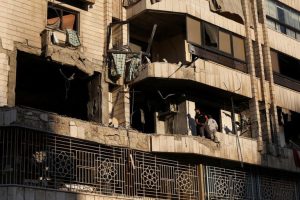
People inspect damage at the site of an Israeli strike on central Beirut’s Bachoura neighbourhood, amid ongoing hostilities between Hezbollah and Israeli forces, in Beirut, Lebanon October 3, 2024. REUTERS/Emilie Madi
© Thomson Reuters
The military has said its incursion is largely aimed at destroying tunnels and other infrastructure on the border and there were no plans for a wider operation targeting Beirut to the north or major cities in the south.
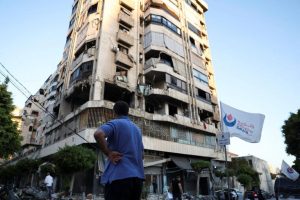
A person stands at the site of an Israeli strike on central Beirut’s Bachoura neighbourhood, amid ongoing hostilities between Hezbollah and Israeli forces, in Beirut, Lebanon October 3, 2024. REUTERS/Emilie Madi
© Thomson Reuters
Nevertheless, it issued new evacuation orders for about two dozen towns along the southern border, telling residents to head north of the Awali River, which flows east to west some 60 km (40 miles) north of the Israeli frontier.
More than 1,900 people have been killed and over 9,000 wounded in Lebanon in almost a year of cross-border fighting, with most of the deaths occurring in the past two weeks, according to Lebanese government statistics.
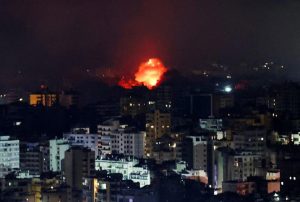
Fire and smoke rise over Beirut’s southern suburbs after a strike, amid ongoing hostilities between Hezbollah and Israeli forces, as seen from Sin El Fil, Lebanon, October 3, 2024. REUTERS/Amr Abdallah Dalsh
© Thomson Reuters
Caretaker Prime Minister Najib Mikati said about 1.2 million Lebanese had been displaced by Israeli attacks.
(Reporting by James Mackenzie and Steven Scheer in Jerusalem; Maya Gebeily and Timour Azhari in Beirut; Parisa Hafezi in Istanbul; Phil Stewart, Jeff Mason and Idrees Ali in Washington; Michelle Nichols in New York; Adam Makary, Jaidaa Taha and Enas Alashray in Cairo; and Tala Ramadan, Jana Choukeir and Jack Kim in Seoul and Matthias Williams in Berlin, Elwely Elwelly and Clauda Tanios in Dubai and Angelo Amante and Giuseppe Fonte in Rome and Parisa Hafezi in Dubai; Writing by Cynthia Osterman and Michael Perry and Michael Georgy; Editing by Deepa Babington, William Mallard and Gareth Jones)
You may like


Tenant St£bs Landlord For Disconneting his Light Over Unpaid Electricity Bills”
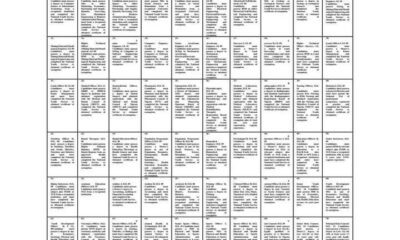

The Federal Civil Service Commission (FCSC) is receiving applications for various vacancies in the Federal Civil Service.
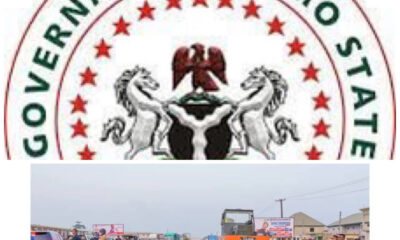

Imo State Government Announces New Appointments to IROMA


Jeremiah useini Abachas bossom friend is dead, the iroko of middle belt has fallen


Mercy Chinwo’s dispute with her former manager, Eezee Tee, has taken a dramatic turn.


Actor Yul Edochie has unfollowed his daughter, Danielle, on Instagram, months after she took the same action against him.
Business
Electricity company bars prepaid metre customers from recharging below N5,000.
Published
2 days agoon
January 25, 2025By
Ekwutos Blog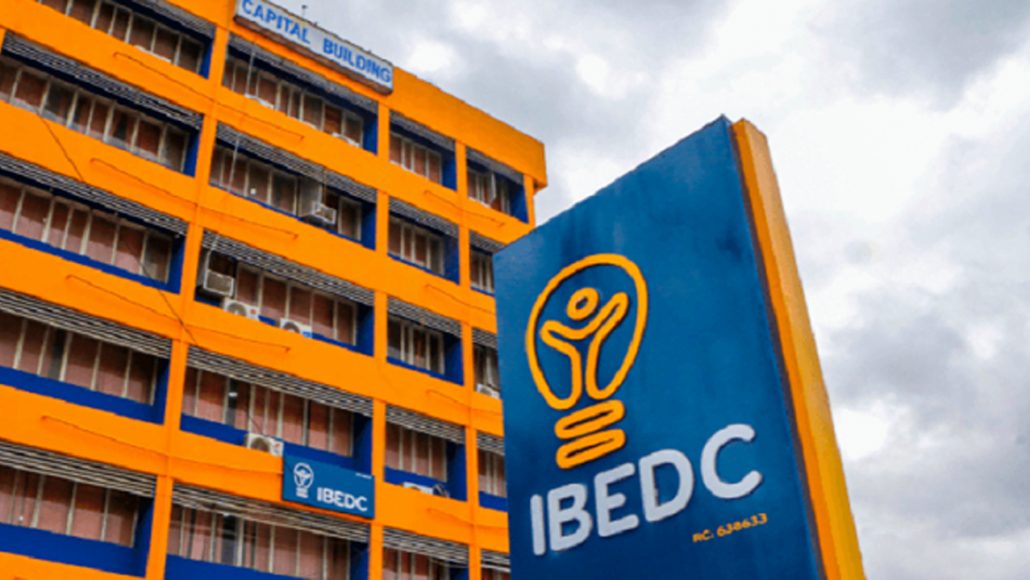
• Recharge Benchmark Policy Illegal, Says Expert
Some low-income earners in the country are currently living in darkness because of the new policy of the Ibadan Electricity Distribution Company (IBEDC) which disallowed prepaid customers from recharging below N5,000.
It was gathered that as a result of IBEDC new policy of N5000 benchmark, some Nigerians within the company’s coverage area compelled to recharge N5000 and above against their natural will while others have resorted to borrowing from families and friends to be able to enjoy electricity through the prepaid metering system.
The Guardian gathered that many others who were unable to meet the recharge benchmark have been left with no choice but to live in darkness.This is even as some of the consumers grapple to pay for high electricity bills under the Band A system imposed on them by the electricity firms.
In a public notice to its customers, the IBEDC stated that: “Please be informed of a recent update regarding IBEDC electricity recharge. Users on Band A are now required to make a minimum recharge purchase of N5,000. Users in other bands must make a minimum purchase of N2,000.
“Kindly note that this new payment structure is effective already and applies exclusively to IBEDC customers,” it stated. It was gathered that this policy was peculiar to IBEDC, as other discos contacted by The Guardian debunked such policy.
However, a lawyer, and an electricity expert, Anthony C. Nwajuigo, said the policy is illegal and a violation of the Electricity Act. He said: “This is illegal and not covered by law. The Multi Year Tariff Order (MYTO) pegged tariff for Band A at around N209.5 per kWh, hence the directive that flouts such MYTO regulation by National Electricity Regulatory Commission (NERC) is not only unconstitutional but illegal and in contravention of the Electricity Act and Federal Competition and Consumer Protection Act, 2018 (FCCPA)”.
Nwajuigo continued: “Stating that customers under band A cannot procure less than N5,000 is absurd. Why other customers cannot procure less than N5,000. It is totally illegal. And it is not just a breach of the NERC regulation on MYTO, it is also a breach of the provisions of the Federal Competition and Consumer Protection Act, 2018 (FCCPA).
“They don’t have such rights. Such a promulgation order made by IBEDC is unconstitutional. Not only is it unconstitutional, it’s illegal. It is a contravention of two extant acts that are regulating the electricity industry.
“Even in Lagos here, where I reside and where I practice, Eko Electricity Distribution Company (EKEDC) and Ikeja Electricity Distribution Company (IKEDC) donot do that. If you want to recharge N1,000, you are permitted to do it. If you want to recharge N500, you are permitted. The only thing is that you are giving the unit that you have recharged,” he stated.
A consumer in Ota area of Ogun State, Bolade Akindele, decried the situation, describing it as unnecessary exploitation of the masses who are still struggling to meet daily needs.
Akindele said: “This policy is inhuman. Even though we are on Band A, consumers should not be subjected to these conditions. Afterall, we are not consuming for commercial purposes. We are still struggling to cope with Band A tariff and now the company is coming with this new recharge policy. It is really not fair.
“We may begin to consider switching to solar energy. With these new developments in the power sector, I am afraid, many people will only be seeing the light but will not be able to afford to use it.”
Business
UK is SECOND most attractive country for investment according to CEOs
Published
5 days agoon
January 22, 2025By
Ekwutos Blog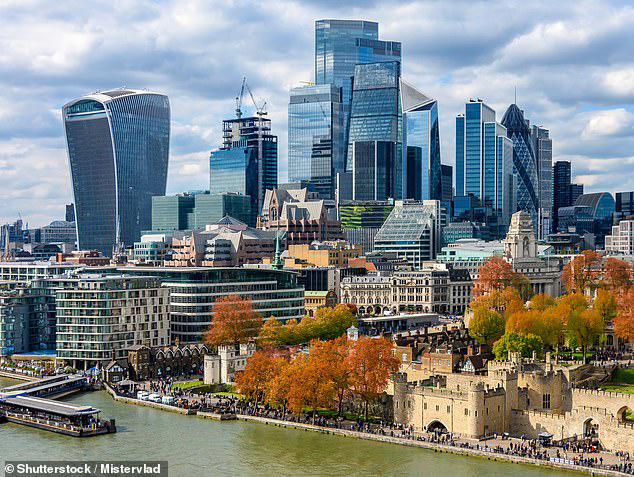
Booming Britain is the world’s second-favourite place to place to invest – just behind the USA – according to a survey of global business leaders.
Around 14 per cent of the near-5,000 corporate bosses surveyed by PwC say they expect the UK to receive the most international investment in the next year.
The survey, published as the World Economic Forum gets underway in Davos, will be a boon to Chancellor Rachel Reeves after criticism of her Autumn Budget and higher-than-expected inflation.
Experts believe that the UK’s relative stability amid global economic uncertainty makes it a favourite for additional investment – and comes ahead of an expected cut in interest rates by the Bank of England amid rising wages.
Britain’s second-place ranking in the PwC CEO Survey is its best since the poll began 28 years ago, and is two places up from fourth last year.
It came second to the US (30 per cent) – and ahead of Germany, China and India (12, nine and seven per cent respectively).
The results suggest Britain is in a prime spot for an influx of investment as competing nations face growing economic crises.
Germany is in the midst of a years-long recession, while China is battling uncertainty after the EU slapped import tariffs on cars while Donald Trumpmulls over tough taxes for Chinese goods.
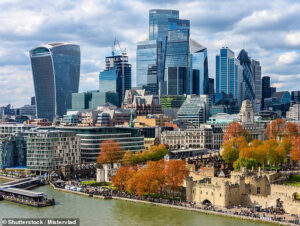
Britain has been named the second best place to invest this year in a poll of 5,000 CEOs from 109 countries
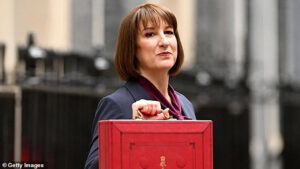
The survey has been welcomed by Chancellor Rachel Reeves, who said it was proof CEOs were ‘backing Britain’ under Labour
And 61 per cent of British CEOs say the country is in line for economic growth – up from just 39 per cent last year.
Experts speaking to MailOnline say there are a number of reasons Britain may attract investment from abroad, including in property, where prices are steady amid an ongoing housing shortage.
Jonathan Gordon, director of wealth at property investment firm IP Global, said: ‘In the context of property, the UK offers much needed stability to global investors.
‘This is not just applicable to London, but up and coming markets like Manchester and Birmingham have shown resilience in the face of global turmoil due to a constant flow of demand.’
Responding to the survey, the Chancellor said: ‘These latest results show global CEOs are backing Britain and the UK is one of the most attractive destinations for international investment.
‘And it’s this investment that will help drive economic growth and improve living standards across the UK.’
Marco Amitrano, senior partner at PwC UK, said: ‘Our CEO survey findings are a vote of confidence in the UK as a place for business and investment.
‘The UK’s relative stability at a time of instability should not be underestimated, nor should its strength in key sectors including technology.
‘However, there is no room for complacency.’
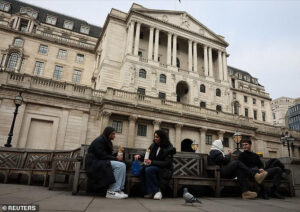
The Bank of England (pictured) is expected to announce a cut in interest rates next month amid wage growth in the private sector – a boon for business
There are concerns the UK’s economy is stalling after official figures showed it grew just 0.1 per cent in November, and a run on UK Government bonds, known as gilts.
The survey data suggests more than half of UK CEOs plan to increase the size of their workforce this year – even as the Chancellor imposes hikes in national insurance and a cut in the threshold at which NI is paid from April.
Interest rates are set to be cut next month after wages rose 5.6 per cent in the three months to November, up from 5.2 per cent the previous three months.
But British bosses are also slightly less positive about the future of their own firms than they were before Labour came in – with confidence dropping from 61 per cent in 2024 to 57 per cent now.
David Belle, a broker and founder of Fink Money, has warned that the UK’s weak pound means investors may simply be using Britain to do business on the cheap before taking their money elsewhere.
‘With a weaker sterling and almost zero demand from UK citizens to own shares in UK companies, there is no bid keeping share prices higher like there is in the US, Canada and Australia,’ he told MailOnline.
‘So any foreign investor is going to see the UK as a place where they can buy assets cheap relative to future cash flows.
‘It’s a sleight of hand to hail this as a UK win. In reality, it’s the opposite.’
Rachel Reeves is travelling to the World Economic Forum in Davos this week, where she will urge company bosses to invest in the UK – likely boosted by the survey results and an upgrade of Britain’s forecasted growth by the IMF.
The international body believes Britain will see a 1.6 per cent expansion this year – slightly up from the 1.5 per cent it pencilled in last October.
‘The time to invest in Britain is now,’ she said in a statement.
She had last been seen gallivanting in China to secure £600million of investment – criticised as a meagre amount in a country with a nominal GDP of $18.5trillion –
But Ray Dalio, billionaire founder of hedge fund Bridgewater, told the Financial Times that the UK could be heading for a debt ‘death spiral’ in which it has to borrow more to cover its rising interest costs.
Business
Breaking News: Nigerian Youngest Billionaire, B-Lord, Pioneers Electric Taxi Revolution in Nigeria
Published
6 days agoon
January 21, 2025By
Ekwutos Blog
In a groundbreaking move for Nigeria’s transport and energy sectors, Nigeria’s youngest billionaire and business mogul, B-Lord, has launched an electric car taxi service, marking a significant step toward sustainable mobility in the country. The initiative is set to commence operations in Anambra State.
In an exclusive statement, B-Lord disclosed that over five containers filled with fully electric city cars are currently en route to Nigeria from China. The vehicles are expected to revolutionize public transport by providing an eco-friendly, cost-efficient, and modern alternative for commuters.
To support this venture, several charging station terminals are already under construction across Anambra State. These charging hubs aim to ensure a seamless experience for the upcoming fleet of electric vehicles, setting the foundation for a robust, sustainable infrastructure.
“This initiative is not just about transportation; it’s about boosting economic growth, creating jobs, and setting Nigeria on the global map of innovation and sustainability,” said B-Lord.
The electric taxi project is poised to enhance the state’s economy by generating employment, reducing carbon emissions, and modernizing the transportation sector. Experts believe this move will ripple across other states, driving further investment in green technology in Nigeria.
As Nigeria takes its first steps into the electric vehicle era, B-Lord’s vision is a testament to the power of entrepreneurship and innovation in shaping a better future for the nation.
Stay tuned for more updates as this transformative project unfolds!

Tenant St£bs Landlord For Disconneting his Light Over Unpaid Electricity Bills”

The Federal Civil Service Commission (FCSC) is receiving applications for various vacancies in the Federal Civil Service.

Imo State Government Announces New Appointments to IROMA
Trending
- Politics11 months ago
Nigerian Senate passes Bill seeking the establishment of the South East Development Commission.

 Business12 months ago
Business12 months agoInflation hits record high of 29.90% on naira weakness

 Politics8 months ago
Politics8 months agoBREAKING: Federal Gov’t Offers To Pay Above N60,000, Reaches Agreement With Labour

 SportsNews11 months ago
SportsNews11 months agoOlympic Qualifiers 2024: CAF Confirms Dates For Super Falcons Vs Banyana Banyana

 Trending3 months ago
Trending3 months agoNYA demands release of ‘abducted’ Imo chairman, preaches good governance
- Business3 months ago
US court acquits Air Peace boss, slams Mayfield $4000 fine

 Politics3 months ago
Politics3 months agoMexico’s new president causes concern just weeks before the US elections
- Entertainment3 months ago
Bobrisky transferred from Immigration to FCID, spends night behind bars

